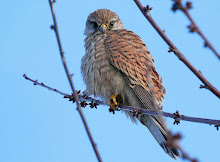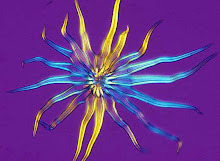At first glance I thought this was a bee, resting on a gorse flower - then I noticed those club-tipped antennae, the un-beelike way it held its wings and its lethargic behaviour. It's a dark birch sawfly Trichiosoma lucorum, one of the club-horned sawflies. Its larvae feed on birch leaves.
Tuesday, May 28, 2024
Birch sawfly
At first glance I thought this was a bee, resting on a gorse flower - then I noticed those club-tipped antennae, the un-beelike way it held its wings and its lethargic behaviour. It's a dark birch sawfly Trichiosoma lucorum, one of the club-horned sawflies. Its larvae feed on birch leaves.
Sunday, May 26, 2024
Waiting for a breeze
The final phase in the dandelion life cycle, when the flowers are transformed into silvery spheres, dandelion ‘clocks’ composed of seeds each equipped with its own parachute, is a magical moment when an umbrella of hairs, a pappus in botanical parlance, carries the seed up and away on the wind, to pastures new. At sunrise in late spring, whole fields can shimmer with silvery dandelion clocks as their pappuses expand as they dry in the sun’s heat. Sometimes goldfinches arrive to feed on the seeds, releasing wraiths of downy seeds, ethereal ‘witches’ gowns’, into the rising thermals.
The name dandelion
is a corruption of the French dent-de-lion, lion’s teeth, describing the deeply
serrated leaf edges, but botanist Geoffrey Grigson also collected 52 parochial
county names. Some, like Devil’s Milk-plant (Kirkudbrightshire), refer to the
bitter milky sap. Many, like Schoolboys’ Clock and Tell Time (both Somerset)
allude to the childhood game of guessing the time by the number of puffs needed
to blow away all its seeds from the ‘clock’. Monk’s head (Wiltshire), likening
the bare seed head left behind to a monk’s bald pate, is said to have medieval
origins, while Wishes (Wiltshire) stems from the belief that the airborne seeds
carry away hopes and dreams with them.
And perhaps this is the best name of all, for these troubled times. Pick a dandelion clock, rediscover your inner child, blow as hard as you can and send dandelion seeds skywards, into the blue.
Monday, May 13, 2024
Cherry-plum, infected with pocket plum disease
Friday, May 10, 2024
Tawny mining bee
I encountered this lovely little female tawny mining bee Andrena fulva, provisioning her newly-excavated nest tunnel with pollen, on the Teesdale Way footpath between Egglestone and Meeting of the Waters. The lower three images are of what I think is a male of the same species, photographed in my own garden in County Durham, where tawny mining bees are excellent pollinators of blackcurrants.
Monday, May 6, 2024
Brittle bladder-fern
Brittle bladder-fern Cystopteris fragilis in a shady, damp retaining wall in Teesdale, North Pennines. A beautiful, delicate fern with brittle frond stalks, typically found in crevices in limestone and mortared walls in the northern dales. Growing with hart’s-tongue fern in the third picture.
Sunday, May 5, 2024
Tawny owl
Ashes limestone quarry at Stanhope in Weardale ceased operations over 80 years ago and has since become a haven for wildlife. The bottom of the quarry is now a lake with a good range of wetland plant species, including mare's tail, reed mace and water mint, and is a breeding site for several dragonfly and damselfly species. The vertical cliff face hosts nesting jackdaws and sometimes its larger cavities ae occupied by less familiar bird species, like this tawny owl that I saw there a couple of weeks ago.








































